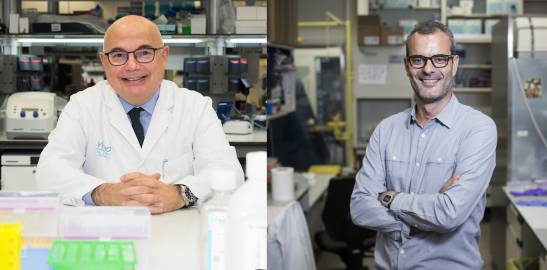The Spanish researchers Josep Tabernero and Salvador Aznar-Benitah were awarded with Lilly Awards of Biomedical Research 2022. These recognitions highlight the scientific career of excellence of researchers who contribute to the development of biomedicine and health sciences in our country.
Tabernero receives the Lilly Award in the Preclinical Biomedical Research category for his studies of the microbiome and its relationship to the Colorectal cancer, aiming to know the prognosis, tumor invasiveness and response to treatment. He is director of Vall d’Hebron Institute of Oncology (VHIO), head of the Medical Oncology Service at the University Hospital Vall d’Hebron and professor at the Faculty of Medicine at the University of Vic – Central University of Catalonia (UVic-UCC).
In turn, Aznar-Benitah received the award in the Clinical Biomedical Research category for her work on how the circadian clock of stem cells when a metastasis is initiated. He leads the Stem Cells and Cancer Laboratory at the Biomedical Research Institute (IRB Barcelona) and is a research professor at ICREA.
Educate the immune system to eliminate cancer
During 2022, 43,370 new cases of colorectal cancer will be diagnosed in Spain, according to data from the Spanish Society of Medical Oncology (SEOM). Josep Tabernero researches and develops drugs to try to improve the evolution of these tumors. Currently, the laboratory he directs is developing strategies to teach the immune system to perceive cancer as a disease that must be fought.
“Immunotherapy proves to be an effective strategy against cancer and we would like it to treat all types of tumors. However, it only works in 15% of patients, which are those with microsatellite instability. In the remaining 85%, immunotherapy does not work because the immune system does not detect that the tumor is an abnormal organism, something to be eliminated”, explains the director of the VHIO.
The use of liquid biopsy knowing how the disease will evolve is another of his lines of research. This line is part of the interaction between the human microbiome and colorectal cancer.
Regarding prognosis, severity and invasiveness, Tabernero details that liquid biopsy is being implemented, which “gives us a dynamic picture of how a disease evolves without the need to use bloody techniques”, he adds.
More than 623 publications support the career of this scientist, who was president of the European Society of Medical Oncology (ISM) for the period 2018-2019, and is a member of the American Association for Cancer Research (BCAA) and the American Society of Clinical Oncology (DISGUSTED).
Illustration of Josep Tabernero’s scientific works. / Lilly Foundation
The intricacies of the stem cell vital clock
Every day we lose hundreds of thousands of cells that need to regenerate, a capacity that is progressively lost with age and completely with the appearance of tumors. Understand how these cells are renewed and specifically how they do it when the metastasisas well as the factors that influence it, is Salvador Aznar-Benitah’s objective.
One of his main discoveries is the identification of the circadian clock of adult stem cells, which, when unbalanced with age, increases the predisposition to the development of tumors.
“The behavior of stem cells is strictly controlled by an internal clock aligned with the circadian rhythm, which allows them to perform their functions at the right time, preventing them from being exposed to unnecessary damage”, says the leader of the Cells laboratory. and Cancer at IRB Barcelona.
“As we get older the robustness of this molecular clock is lost, accumulates more damage and therefore the tissue ages, which is related to the predisposition to develop tumors. In fact, according to mouse models, without this clock, life would be cut in half in time”, he stresses.
Recognized internationally for his important contributions, Aznar-Benitah is one of the most dynamic researchers in this and other areas of study, with over 70 articles published in peer-reviewed journals.
Illustration of Salvador Aznar’s scientific works. / Lilly Foundation
